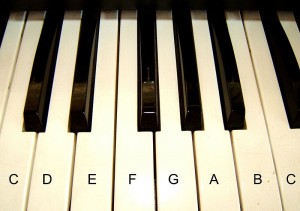 My husband and I homeschool our children. This has changed in the last several years from Mom doing all the schooling with Dad’s support, to a true collaborative family effort. At this point, both Mom and Dad are working, so the structure of “school” has changed. Mom manages our middleschooler, who now does most of her work independently on her no-internet laptop (Thanks Aunt Jen). Our preschooler enjoys a day of preK at our homeschool coop and SEVERAL music classes each week. Our boys are working on first grade and require the most teaching time right now. To help balance this with work, Mom teaches Reading and Religion; Cousin Katlyn teaches Phonics and Handwriting and provides storytime and gametime; and Dad teaches Math and Music. This division of labor ensures that if one adult is too busy with work, the boys will at least cover 2/3 of their subjects for the day and ultimately, it all balances out.
My husband and I homeschool our children. This has changed in the last several years from Mom doing all the schooling with Dad’s support, to a true collaborative family effort. At this point, both Mom and Dad are working, so the structure of “school” has changed. Mom manages our middleschooler, who now does most of her work independently on her no-internet laptop (Thanks Aunt Jen). Our preschooler enjoys a day of preK at our homeschool coop and SEVERAL music classes each week. Our boys are working on first grade and require the most teaching time right now. To help balance this with work, Mom teaches Reading and Religion; Cousin Katlyn teaches Phonics and Handwriting and provides storytime and gametime; and Dad teaches Math and Music. This division of labor ensures that if one adult is too busy with work, the boys will at least cover 2/3 of their subjects for the day and ultimately, it all balances out.
Yesterday we were faced with an interesting dilemma. As John and I sat together at separate computers plowing through daily tasks and curriculum development, I asked, “Are you going to have time to work with the boys today?” Which means “Please tell me you are going to work with the boys today!”
The answer, “Yes, but only one subject.”
When the time came, I had just finished a delightful reading lesson with one cherub and a painful one with the other. “Make it music.” I implored, “When you keep up their music lessons, everything clicks.”
We have always had lofty goals for our children and music studies. We value it. We dedicate our life to promoting faith-inclusive early childhood music education. But while our children have spent their preschool years immersed in the arts, we continually find higher music studies at the bottom of the daily to-do list when it comes to homeschooling. Statistics prove that music studies directly impact a child’s academic achievement and IQ. “One study (by researchers at the University of Wisconsin and the University of California) shows that when three and four-year-old children were given simple piano lessons over a six-month period, they performed 34% better than other children in IQ tests, some of whom had had computer lessons instead. These impressive results came from a study of 789 children from diverse social and economic backgrounds…Several studies indicate that the reading level of students with one year of music was nearly one grade higher than their peers without such music training.” (“The Benefits of Music on Child Development,”MENC) Research is showing further benefits in SAT scores, behavior, medical school admissions, even reduced risk of committing a crime!
Personally, I know successful homeschool families who have put formal music studies first, often requiring little else in formal studies than practicing an instrument and doing a math workbook page. Their homes are filled with books, enriching toys, and music. The children are deeply involved in the arts at the community level. These children have become great achievers in higher education whether pursuing music or other disciplines.
So now, we are putting music first. For us, regular practice in music seems to almost magically create progress in reading, math, character, and even insights in religion, even when those subjects have been a bit neglected.
Well, Dad did make it music yesterday. Ironically, he had a wonderful guitar lesson with the child who tortured me through reading, while my cherub made his drum lesson into an exercise in parental patience.
God bless you and your sometimes cherubs,
Kate Daneluk



